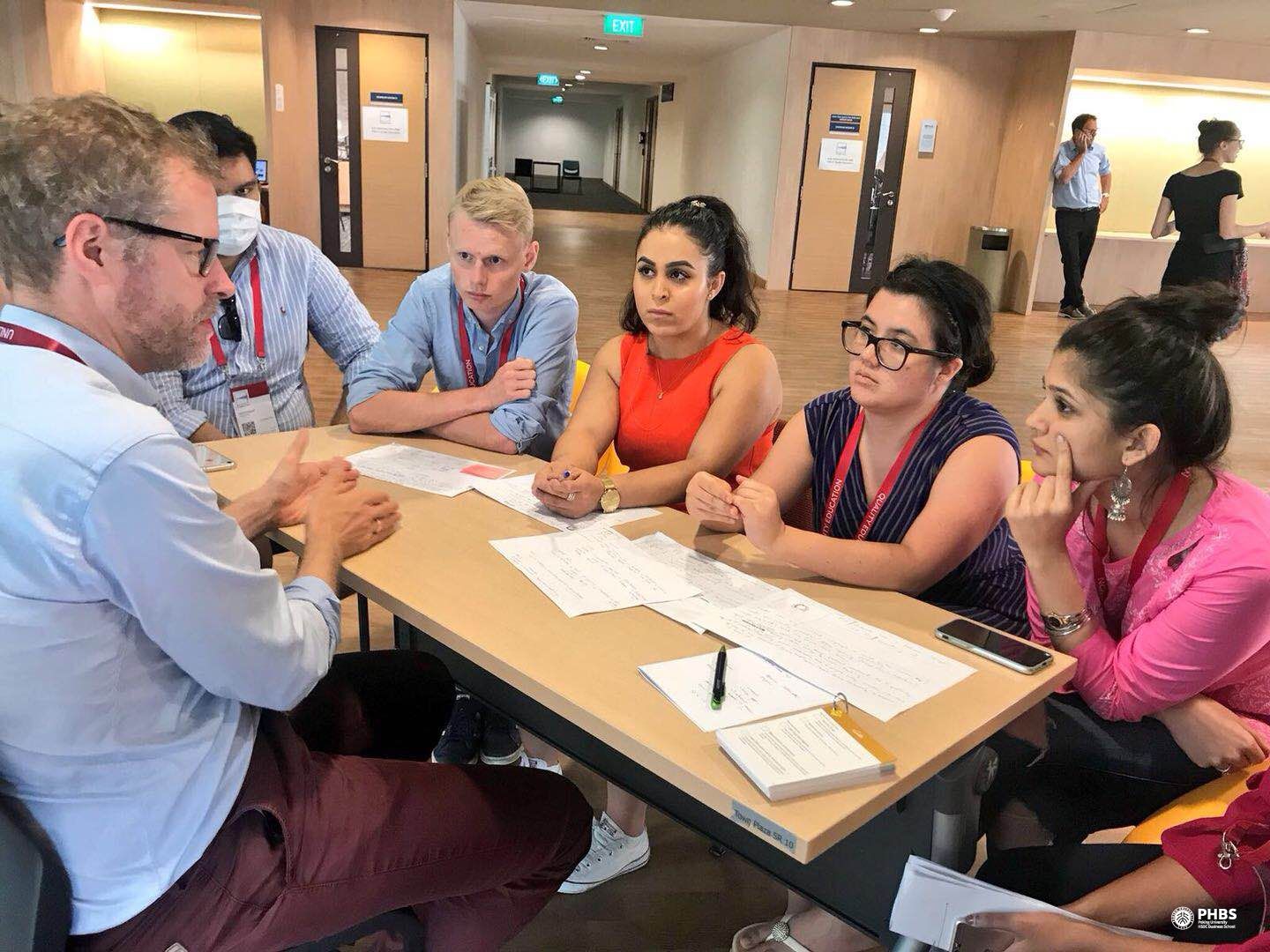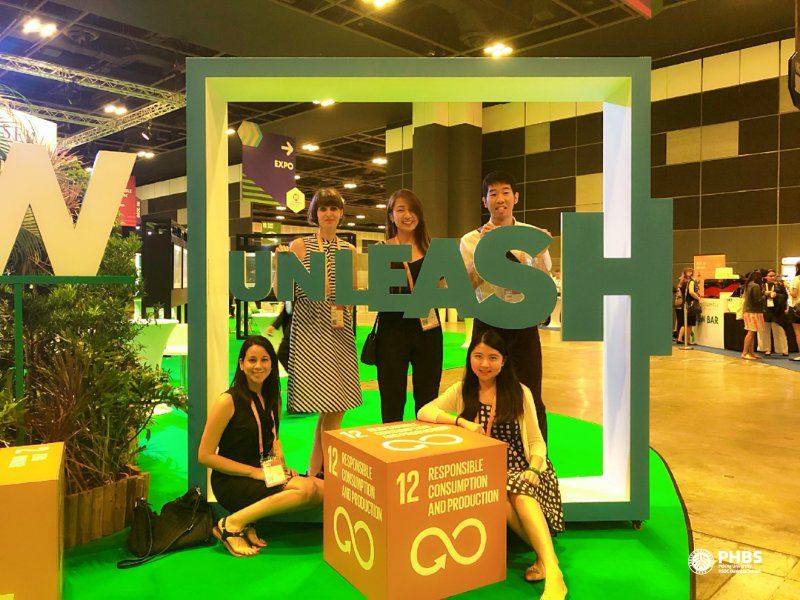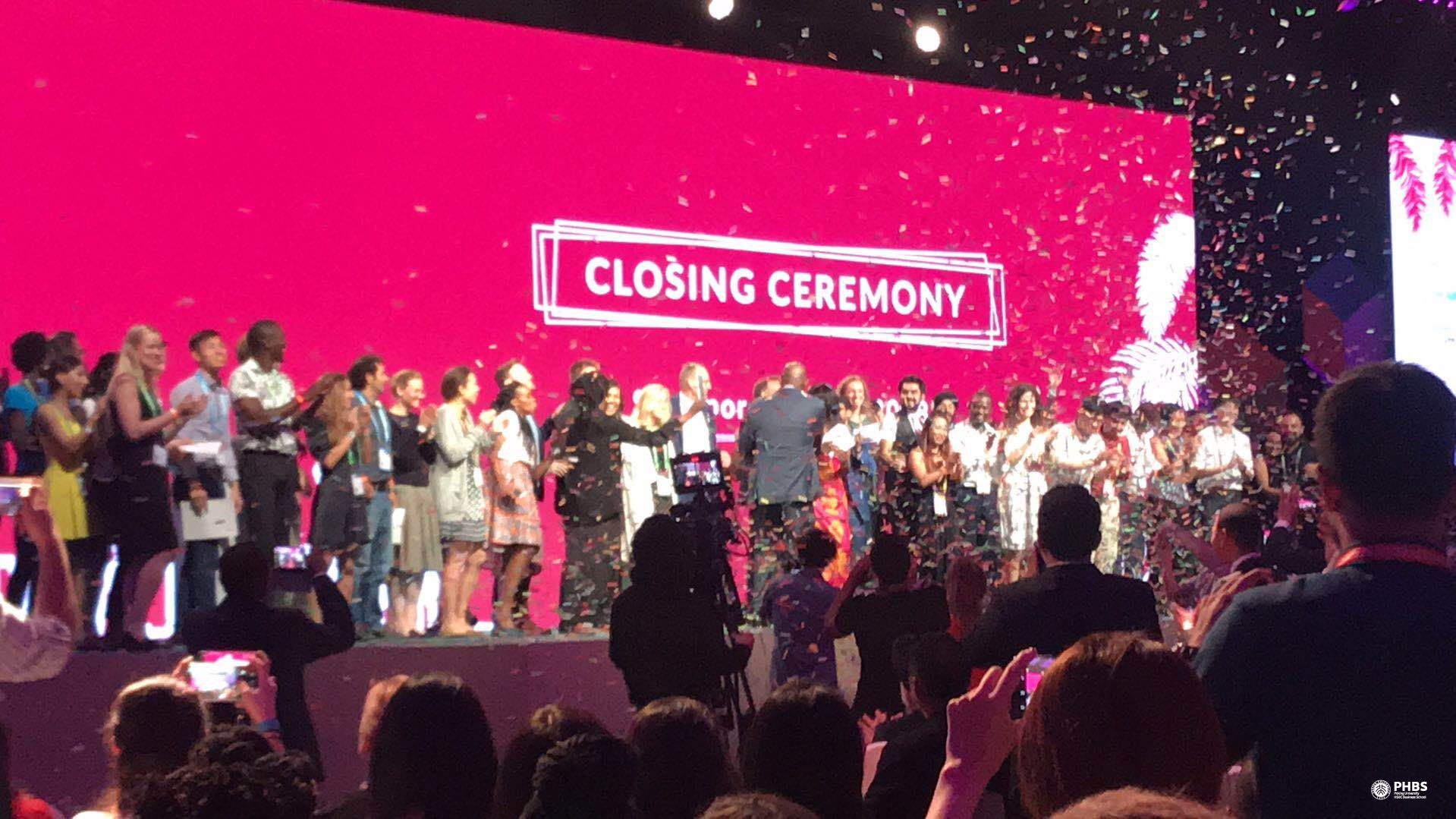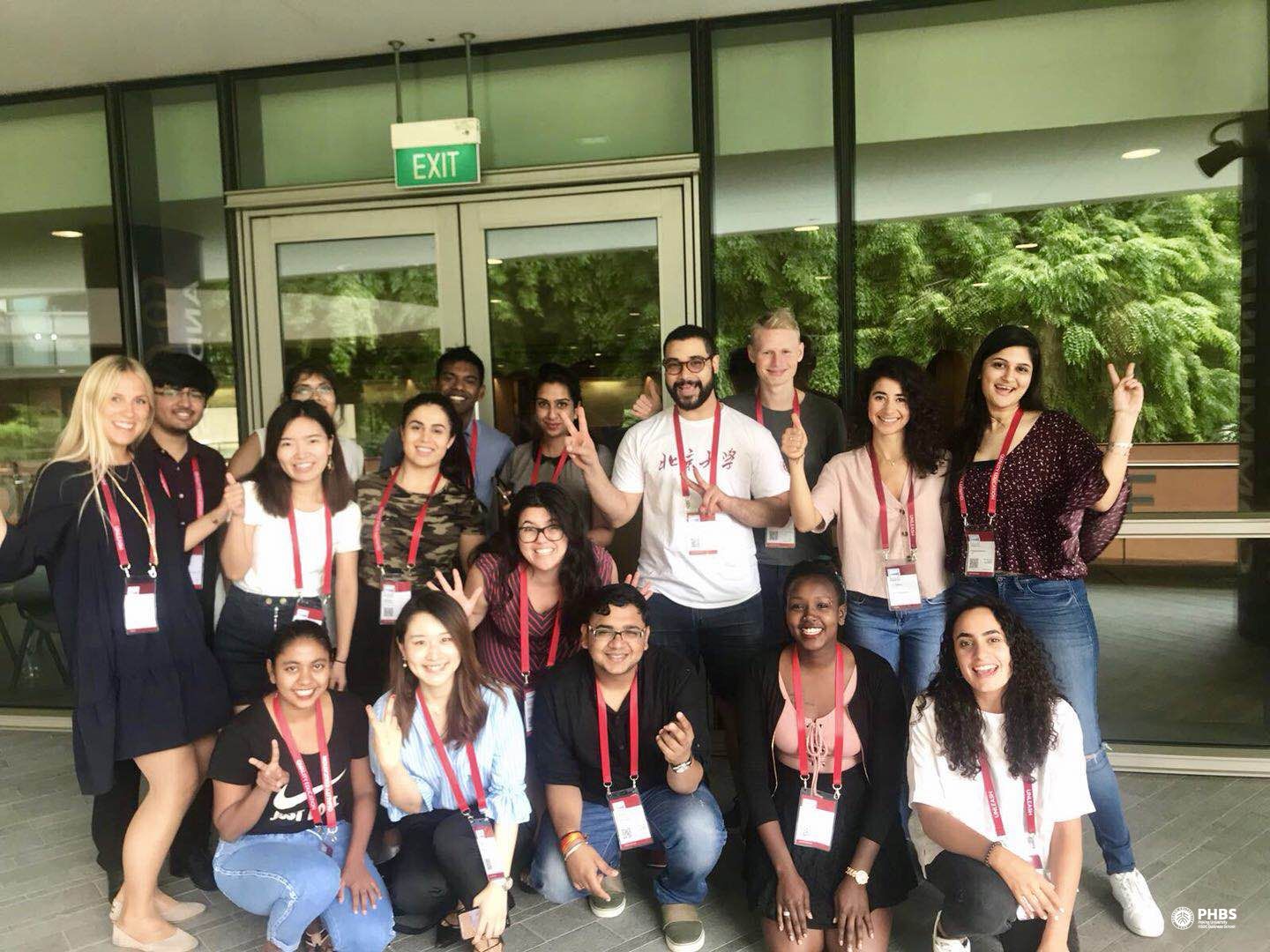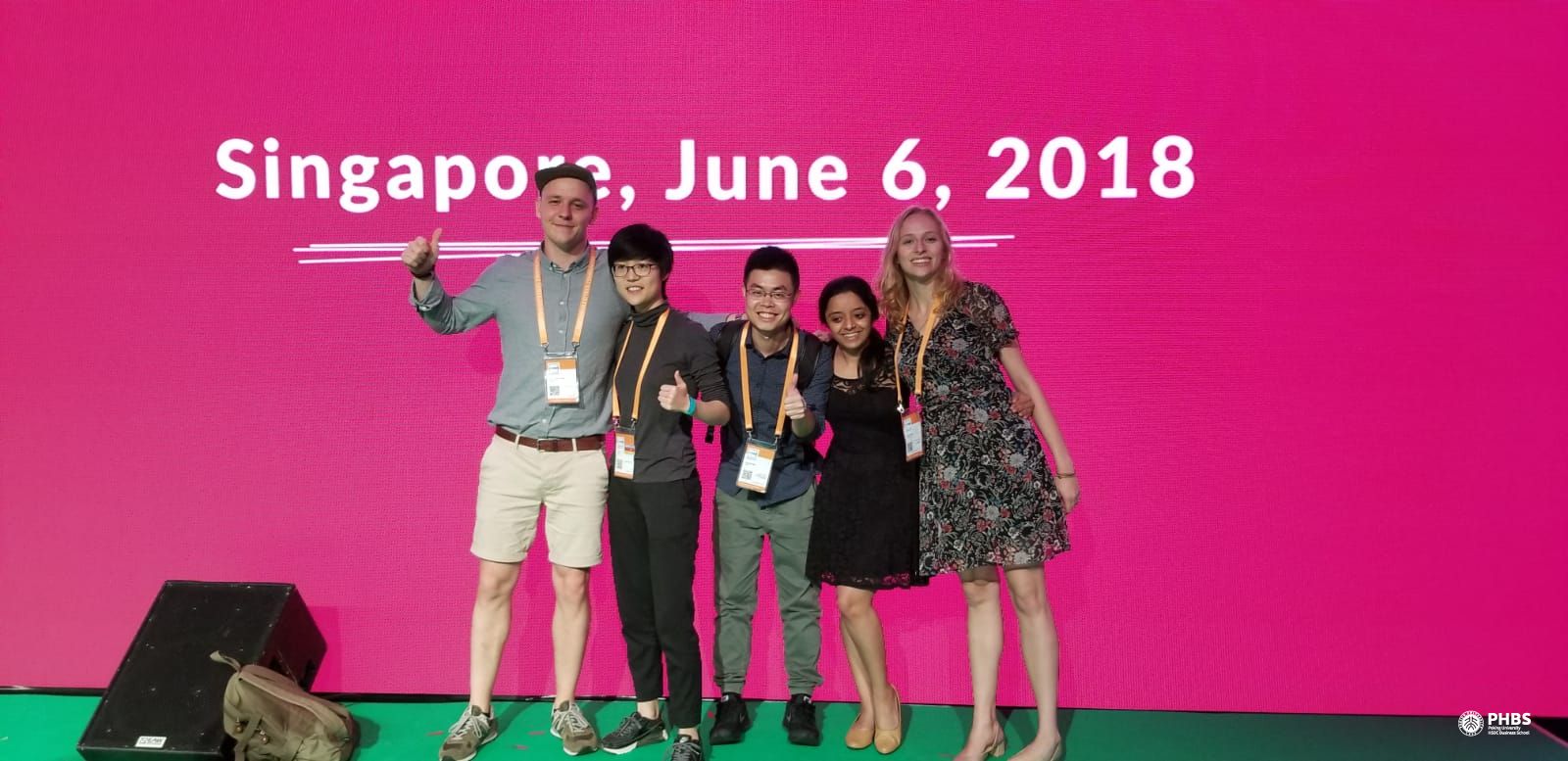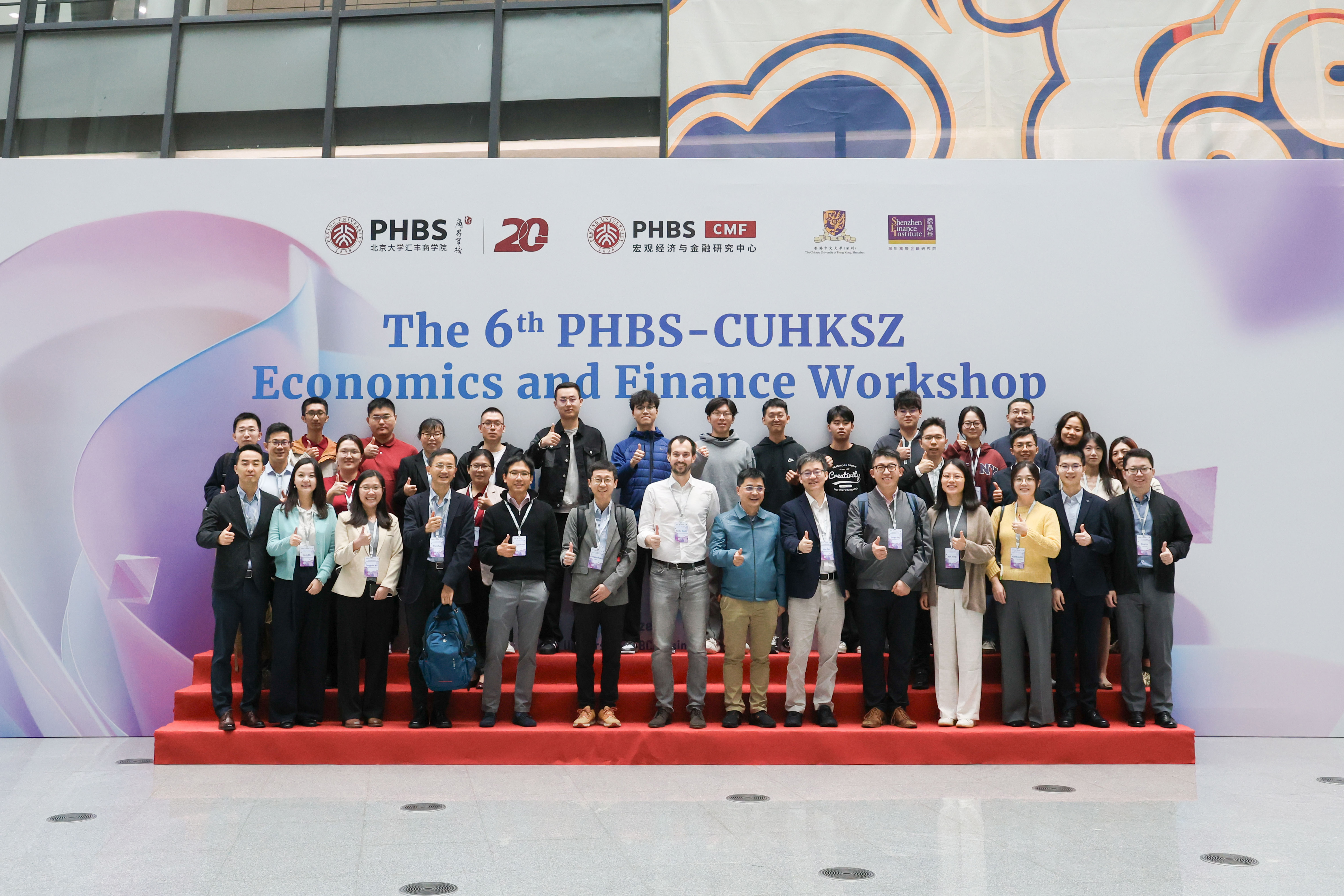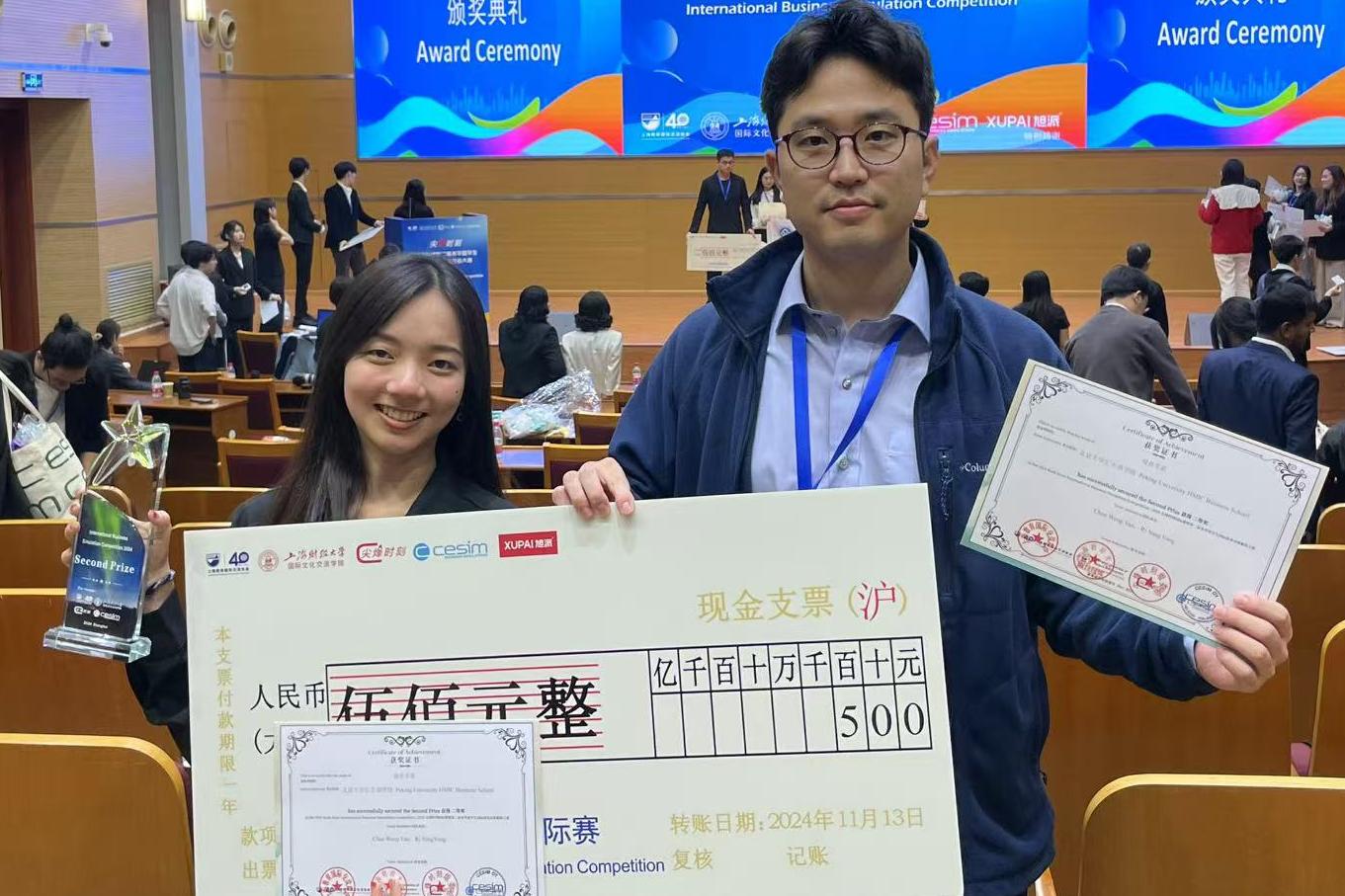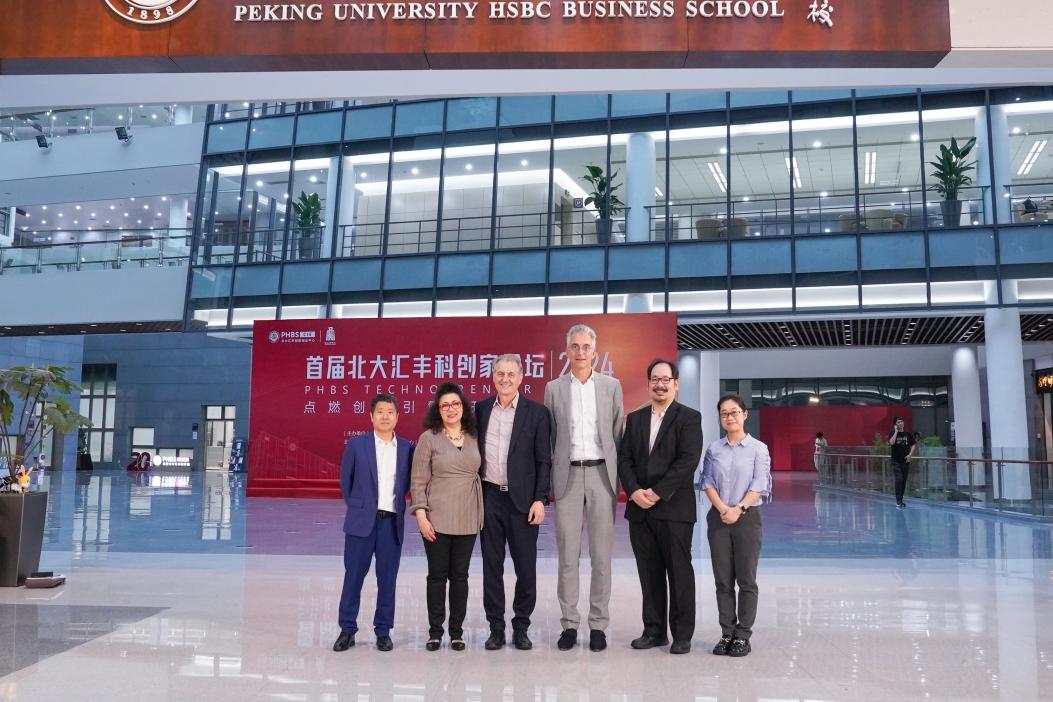The landing gear was down and soon after we touched down back in the Shenzhen. I exhaled in relief after what had been a very turbulent descent as we flew over Hong Kong due to the typhoon affecting the region. After 10 days in Singapore, it felt good to be back in the Motherland. I crawled into my bed knowing that I’d spend the entire weekend in ordering waimai and refusing to do anything that required any effort. However, Peking University HSBC Business School (PHBS) had other plans for me and I was already on my feet early next morning.
PHBS students arrive at Nanyang Technological University of Singapore for the inauguration ceremony of UNLEASH Singapore 2018. From left to right, Javier Villareal (economics graduate),Jana Hejdova (finance),Christina Shi (management), Seimar Solano Nelson (management), Nian Yasong (finance) and Yao Huanchen (economics) .
Along with other PHBS students, or PHBSers as we call ourselves,we had just completed our participation in UNLEASH,with a generous Daxihang scholarship from PHBS. UNLEASH is a non-profit organization founded in Denmark under the vision of D.Sc. Flemming Besenbacher and developed by partners from different countries and across different industries.
The initiative brings together 1000 young talented minds from more than 108 countries to design and create social impact in alignment with the United Nations’ Sustainable Development Goals (SDGs). The SDGs, also known as the Global Goals, aim to leave no one behind with a universal call to action to protect the planet, end poverty, and ensure peace and prosperity to everyone. As the Executive Director of UNLEASH, Henry Skovby, puts it: It’s not so much about how successful you’re in life, but how significant you’re to the community, and what we are trying to do is give all of you the opportunity to be significant to the community.”
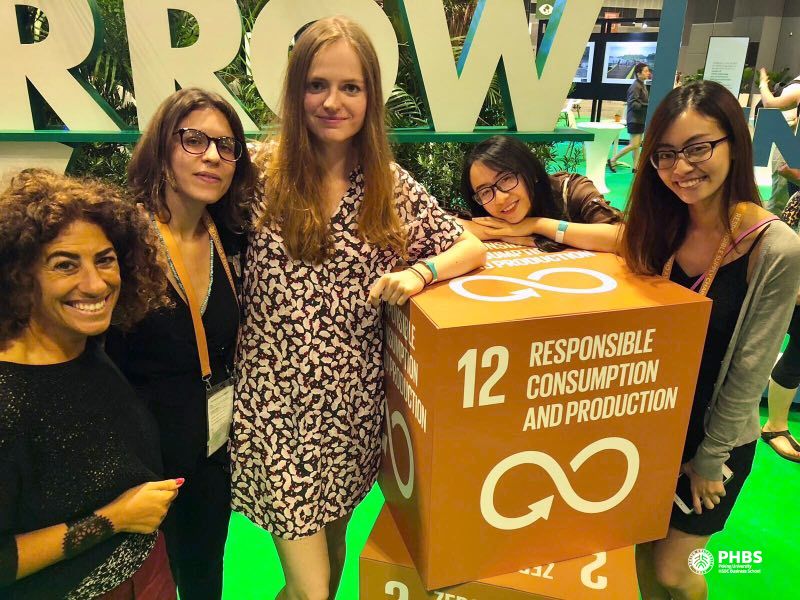
Jana and her team during the closing ceremony at Suntec Convention Centre
The master students were nominated by PHBS and selected by UNLEASH from among thousands of applicants for the intensive one-week innovation lab. Field experts such as Marc Lepage of the United Nations Development Programme, Helle Gudmandsen of the NGO Save The Children, Nobel Peace Prize awardee Jose Ramos-Horta, the President of Singapore Halimah Yacob, among other senior UN officials and corporate executives who attended as guest speakers, advisors, facilitators, and other roles.
“I felt the need to do something for society,” said Christina Shi about her motivation for participating in UNLEASH. “At a seminar at PHBS conducted by world-renowned economist Jeffrey Sachs, I was ignited with a passion for the SDGs.” At around the same time Shi found about UNLEASH and said “it was a perfect opportunity for me.”
Shi’s feeling is commonly shared by everyone at UNLEASH. Many wonder how can they become global shapers. Taking part in UNLEASH is a good start.
A team in the Quality Education track receiving feedback by Torbjørn Sindballe, one of Deloitte's top leaders.
Under the the guidance and expertise of Deloitte, UNLEASH’s lead execution and innovation partner, the talents (as we were called) embarked on the design-thinking process to tackle real-life challenges with solutions in accordance with eight of the seventeen SDGs: Zero Hunger, Good Health and Well-being, Quality Education, Clean Water and Sanitation, Affordable and Clean Energy, Sustainable Cities and Communities, Responsible Consumption and Production, and Climate Action.
The process consists of five stages: Problem Framing, Ideation, Prototyping, Testing and Implementing. Each of the stages had gate checks with experts that the teams needed to go through by completing certain requirements and only able to move forward when the gate was cleared. Framing a problem was more challenging than many of us expected. In fact, we spent a two days on average framing the problem. Even the UNLEASH anthem, which was written during that week in Singapore with the collaboration of many of the talents and staff, attests to it: “I’ve been working for more than 20 hours a day, how could I still be framing problems?”
Huanchen and her team during the closing ceremony at Suntec Convention Centre.
Javier, who’s focus was Sustainable Cities and Communities, along with his team developed a very interesting project with a peculiar name: Tinder for Tomatoes. The initiative seeks to create an open source platform for urban farming. Different to many of us, Javier mentions how every team member was able to get along with everyone else and worked quickly. “We were the first through the first gate, and then we were rushed through all of the gates.” Apparently their idea had caught the attention of the facilitators and were eager to see the prototype. “The facilitators we had were looking forward to see our product, they could potentially be our customers, so a certain degree of objectivity was lost because we narrowed to one idea very quickly.” Each team was required to have at least three ideas during the ideation stage, but Javier and his team had settled for that one great idea from the beginning.
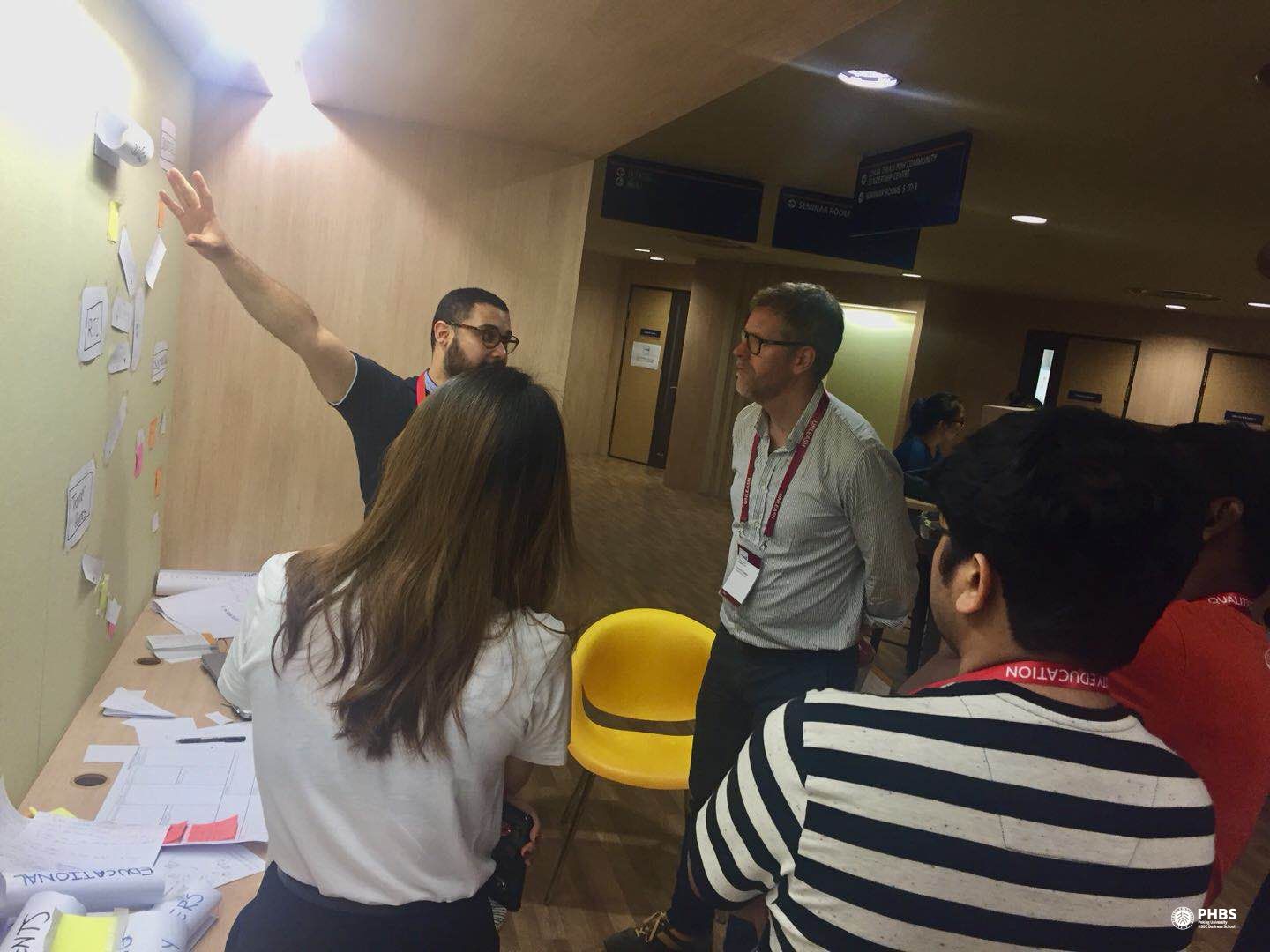
Seimar and his team during the ideation stage presenting a possible solution to Torbjørn Sindballe, one of Deloitte's top leaders.
“Being part of UNLEASH helps you to meet people of diverse background, helps you work in a team with people of different backgrounds, different experience, education, and personalities,” said Christina. “On my team I had Ankit, who works in a VC, and I learned a lot from him, because during the process he brought that edge about how a VC would see the project and was able to preview questions that we were most likely to be asked during the pitch or at the marketplace. I developed a strong bond with him through the work we did.”
Yet, diversity can have both positive and negative sides. It comes to how it is handled. On one side diversity allows the input of ideas from different perspectives and experiences. On the other side, there is a lot of frustration. Since the time is fixed, everyone expects to work efficiently and as quickly as possible to go through the gates, but you find out that the difference in culture is an additional challenge to deal with.
We learned that some cultures are more communicative during their thinking process, while others tend to keep quiet, causing frustration for some others who may feel excluded or as though they are stuck. Some saw the process as a one-way street, where commitment to one idea was important to keep them pushing forward, while others saw it part of the process to go back to square one and rethink the problem or the users. Some felt other talents were more idealistic and not directly focused on the task at hand, while others had arrived at UNLEASH with a concrete idea to develop that was not welcomed in the group. Thus, the innovation lab is a challenge that goes beyond ideating a solution. It tests your leadership, teamwork, and influencing skills.
“But they are very diligent, self-motivated, and looking to collaborate,” said Huanchen about her team. When asked about his favorite UNLEASH moment, Nian Yasong says that he “actually enjoyed working with my team all throughout, so I would say the whole process itself was my favorite part.”
“I think it would be nice to have half-a-day off to think about your idea and decide whether to move forward with it or not,” said Jana. “But everything at UNLEASH is so fast-paced that you have no time to stop and rethink.”
The Closing Ceremony turned into a party at the end to celebrate all the hard work and dedication of the people behind UNLEASH, the talents and the new innovative solutions.
Although we were working hard and getting by with few hours of sleep – say three– and ridiculous amounts of coffee to keep us well awake for two more weeks after UNLEASH was finished, the team behind UNLEASH also made sure we got time to play, bond with talents from across different tracks and clear our minds. Some visited the National Gallery of Singapore, Gardens by the Bay, or went out in a scavenger hunt. But we all came together to Development Bank of Singapore’s (DSB) Marina Regatta where our physical agility was put to test. From the very basic level -which wasn’t very basic, honestly- of a set of obstacles in a pool to the insane level (sort of like what you at the CrossFit Games), there was something for everyone to do.
Talking about what we take with us from the UNLEASH experience, many of us agreed, jokingly of course, that it made us aware of how much work we can get done with little sleep and tons of coffee. A new set of boundaries we now can use at PHBS!
Some of the Quality Education Talents
But in a serious tone, Christina said that “there’s one project that gave me a very good insight, and it is the one about the coffee cups. It shocked me how much coffee people drink every day and the amount of coffee cups that go to the landfill.” Christina referred to a project where the solution was to create a firm, piloted in London, that would provide mugs to the coffee shops in exchange for a minimal fee that includes the delivery, collection, and cleaning of these, in an attempt to reduce the number of disposable cups. “I immediately linked it to China and the number of cups that we use for tea. There is so much garbage created in China every day, because of the consumption style, so that sits in the back of my head now and I want to do something about it.”
Huanchen believes that Chinese lack confidence in themselves in programs like UNLEASH. “Chinese should be more confident in this type of international event, because I am quite sure Chinese people are innovative and creative enough. At the marketplace and during the pitch, I saw many ideas already exist in China and many Chinese entrepreneurs are developing solutions in these areas, incorporating fintech, blockhain, and shared economy. So, actually I think China is a very promising country.”
Once the problem framing and ideation gates were cleared, the teams focused on creating a prototype and testing it. Not only did we have access to labs with 3D printers, we also had access to literally anybody we wanted to talk to through the extensive network that was centered at UNLEASH. With the extensive network of the UN delegates, NGO representatives, corporate employees and directors, foundations, etc. all around us, it was easy to get on a video call with the people we were creating the solutions for to receive immediate feedback and test the feasibility out in the field.
Once the testing was done, it was time to pack things up, set up a whiteboard, practice the pitch, and create the PowerPoint slides – all in one night! After the pitch in front of all the other groups focused on the same SDG, we headed to the marketplace at Suntec Conference Centre, where we met with investors looking for our innovative solutions.
Nian Yasong and his team during the closing ceremony
❈❈❈
About Our Projects
The following are the solutions that each of the PHBSers devised along with their team during UNLEASH.
Christina Shi
PROPEL is a solution for social enterprises that struggle to have a commercially viable business model and are thus unable to scale. PROPEL is a one-stop app that provides mentor-driven, customized and tailored business education to for-profit social-impact-driven entrepreneurs.
Jana Hejdova
As part of SDG 12 – Responsible Consumption and Production, Jana and her team aimed to tackle the problem of mass consumption of plastic bottles through their solution Heex. “We created an immersive water station that would be engaging enough for young people not only to refill their bottles, but to better understand where water on Earth comes from. By connecting them to the natural source of the water, we hope to foster an understanding in them that plastic bottles are not the ultimate solution; thus, aiming at behavioral change through education.”
Javier Villareal
Tinder for Tomatoes seeks to facilitate the implementation of urban farming through an open source platform that will later be transmitted to a production NGO to diffuse customizable urban farming systems. Part of the profits will go to fund the delivery of simple solutions to key societal groups in order to make urban farming mainstream in highly dense populated cities.
Nian Yasong
Driven by the increasing sexual assaults and harassments, Yasong and his team designed MeriBhi (hindi for my bus), a platform that will help women have a safe ride experience free from sexual assault. “Based on social media and emergency hotline SMS data, we leverage aggregation methods and NLP solutions on a near real time basis to create safe route maps that women can use to plan their bus journey. For the local government authorities, local NGOs and Delhi Transport, our dashboard based on this data can be used to deploy resources such as Bus Marshal, CCTV solutions and traffic police more efficiently.” MeriBhi aims to start in India and later launch in other cities, such as São Paulo and Cairo.
Seimar Solano Nelson
S.E.Y. (Sustainable Education for the Young) Yes! is a solution that seeks to invigorate education in the rural areas of India. Driven by the disparity in quality education between rural and urban areas, and the underlying deteriorating motivations of the teachers who work in isolation, S.E.Y. Yes! aims to bridge the rural teachers with others and urban experts through a platform that will allow them to schedule and attend face-to-face training sessions with the experts at designated training centers to leverage the knowledge to the students. The platform is designed and based on the shared economy business model supported by various partners that will reward the efforts of the experts and teachers. In addition, the platform is complemented by a sustainable program that seeks to pull a number graduating high-school students out of the rural areas and into the workforce at one of the various partner companies to be trained in-house and inserted into the workforce.
Yao Huanchen
The entire world is producing more food, but the rate of hunger is still increasing. Between 20% and 30% of food is thrown away due to cosmestic filtering practices adopted by the retail industry. Sweethub will establish a new socially-conscious food hub for mechanically harvested, locally-sourced sub-optimal sweet potatoes to serve as the connection between farmers and customers. Sweethub hopes to launch in Mississippi as it is one of the top producing regions of sweet potatoes in the USA.
❈❈❈
“This is not the end, it’s the end of the beginning,” said UNLEASH chairman, D.Sc. Flemming Besenbacher, during the closing ceremony. His words resonated deep within many of us who seek to continue our journey beyond UNLEASH to materialize our solutions.
By Seimar Solano Nelson
Edited by Priscilla Young and Annie Jin







